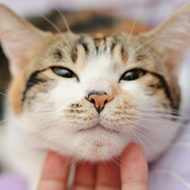
Findings provide rare insight into cat-human communication
A study conducted by psychologists at the Universities of Sussex and Portsmouth has revealed for the first time that a slow blinking technique can be used as a form of positive communication between cats and humans.
The study - published online inScientific Reports – was led by Dr Tasmin Humphrey and Professor Karen McComb, animal behaviour scientists at the University of Sussex.
Professor McComb said: “As someone who has both studied animal behaviour and is a cat owner, it’s great to be able to show that cats and humans can communicate in this way. It’s something that many cat owners had already suspected, so it’s exciting to have found evidence for it.”
The research team undertook two experiments, both of which were video recorded. The first experiment included a total of 21 cats from 14 different households and their respective owners. After waiting for the cat to settle in one place, the owner sat near the animal and tried both the slow blinking technique and no interaction at all.
This experiment showed that the cats were more likely to slow blink at their owners after their owners had slow blinked at them, compared to no interaction on the owner's part.
The second experiment included a total of 24 additional cats. This time a researcher from the team either slow blinked at the cat or adopted a neutral face without direct eye contact. The researcher also offered the cat their hand, to see if the animal would approach.
According to the study, the cats were found to be more likely to approach the experimenter’s outstretched hand after they’d slow blinked at the cat, compared to when they had adopted a neutral expression.
Author of the study Dr Humphrey said: “Understanding positive ways in which cats and humans interact can enhance public understanding of cats, improve feline welfare, and tell us more about the socio-cognitive abilities of this under-studied species.
“Our findings could potentially be used to assess the welfare of cats in a variety of settings, including veterinary practices and shelters.”



 The latest
The latest